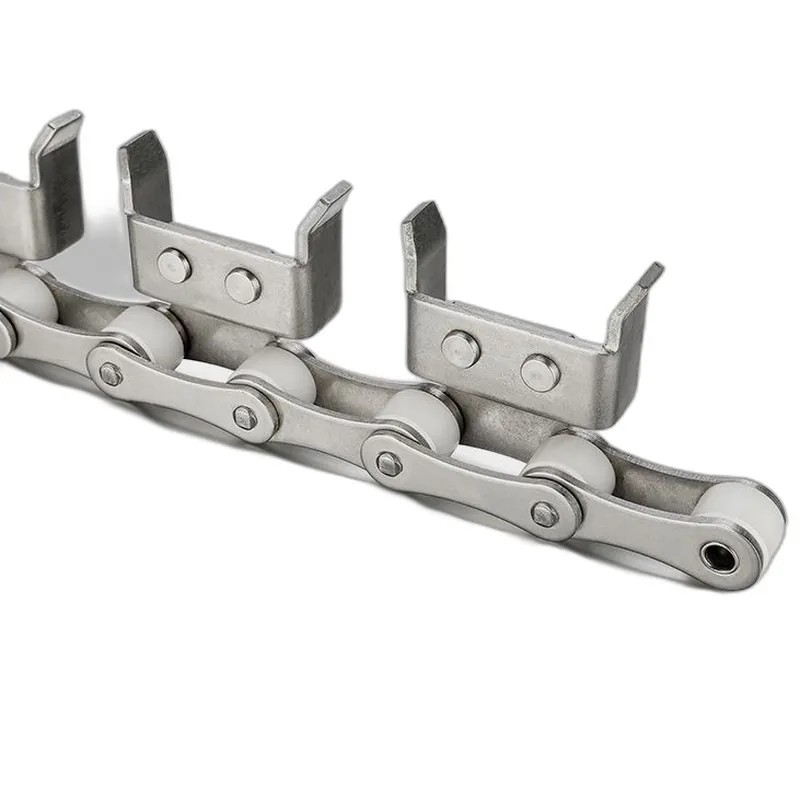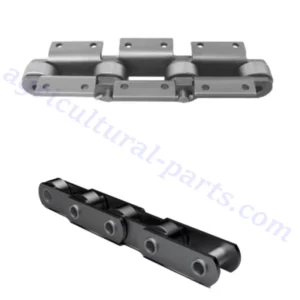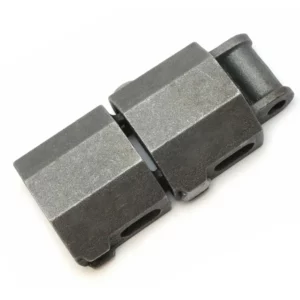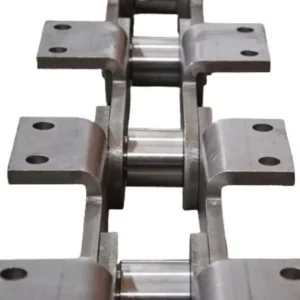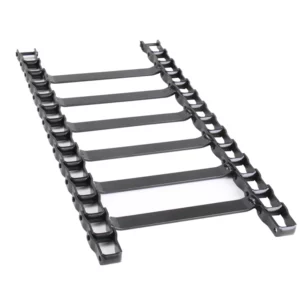Stainless Steel Conveyor Chain for Cold Drink Production
A stainless steel conveyor chain for cold drink production is a specialized industrial chain system designed to efficiently transport bottles, cans, or containers through various stages of cold drink manufacturing. Made from high-quality stainless steel, it offers excellent resistance to corrosion, moisture, and temperature variations often present in beverage production environments. These conveyor chains ensure smooth, hygienic, and durable operation, meeting stringent food safety standards. They are commonly used in filling, capping, labeling, and packaging processes, ensuring precision and reducing downtime in high-speed production lines.
A stainless steel conveyor chain for cold drink production is a specialized industrial chain system designed to efficiently transport bottles, cans, or containers through various stages of cold drink manufacturing. Made from high-quality stainless steel, it offers excellent resistance to corrosion, moisture, and temperature variations often present in beverage production environments. These conveyor chains ensure smooth, hygienic, and durable operation, meeting stringent food safety standards. They are commonly used in filling, capping, labeling, and packaging processes, ensuring precision and reducing downtime in high-speed production lines.
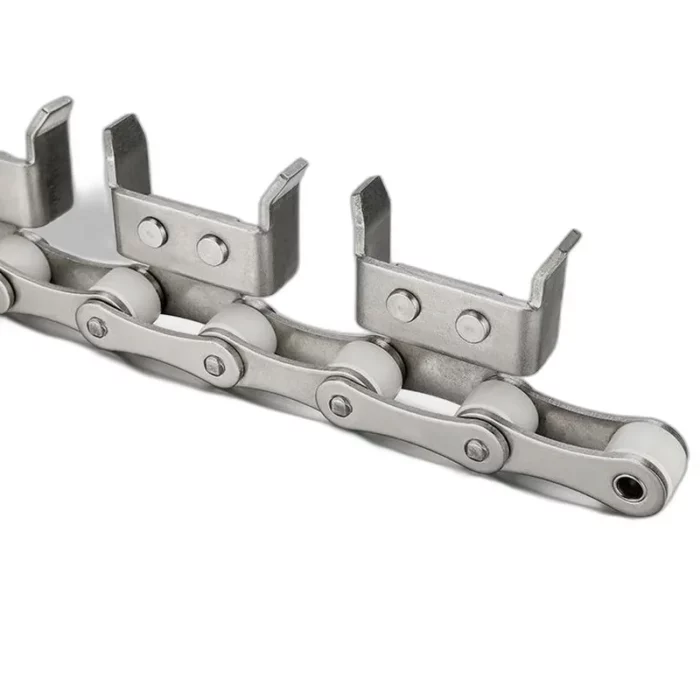
Dimensions of Stainless Steel Conveyor Chain for Cold Drink Production
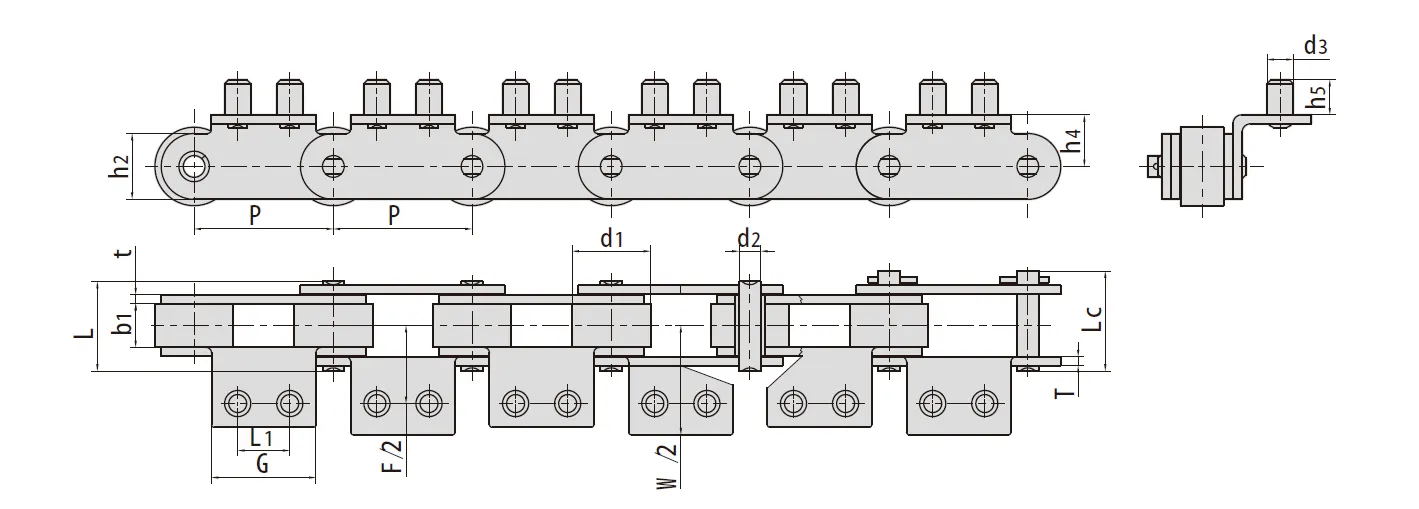
| Chain No. | Pitch | Roller diameter | Width between inner plates | Pin diameter | Pin length | Inner plate depth | Plate thickness | Tensile strength | Weight per meter | |
| P | d1 max | b1 min | d2 max | L max | Lc max | h2 max | t/T max | Q min | q | |
| mm | mm | mm | mm | mm | mm | mm | mm | kN/lbf | kg/m | |
| C2082SSA2F3 | 50.80 | 28.58 | 15.75 | 7.92 | 32.70 | 36.5 | 22.60 | 3.25 | 39/8767 | 2.8 |
| Chain No. | G | L1 | F | W | h4 | h5 | d3 | |||||||
| mm | mm | mm | mm | mm | mm | mm | ||||||||
| C2082SSA2F3 | 38.10 | 19.05 | 57.16 | 78.00 | 18.50 | 12.70 | 9.53 | |||||||
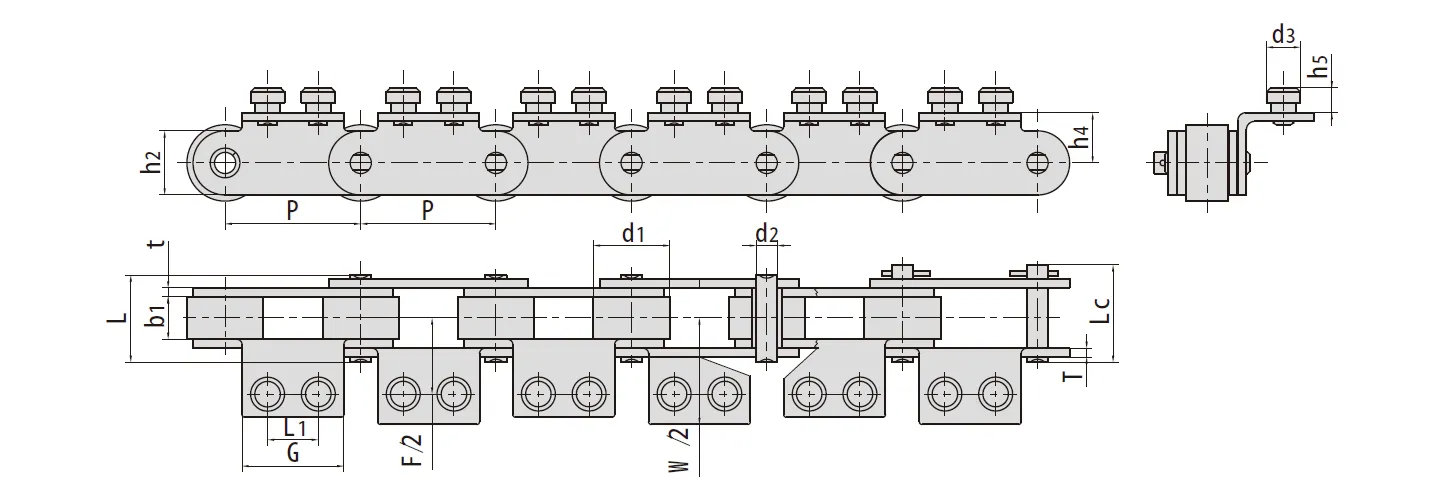
| Chain No. | Pitch | Roller diameter | Width between inner plates | Pin diameter | Pin length | Inner plate depth | Plate thickness | Tensile strength | Weight per meter | |
| P | d1 max | b1 min | d2 max | L max | Lc max | h2 max | t/T max | Q min | q | |
| mm | mm | mm | mm | mm | mm | mm | mm | kN/lbf | kg/m | |
| C2082SSA2F4 | 50.80 | 28.58 | 15.75 | 7.92 | 32.70 | 36.5 | 22.60 | 3.25 | 39/8767 | 2.8 |
| Chain No. | G | L1 | F | W | h4 | h5 | d3 | |||||||
| mm | mm | mm | mm | mm | mm | mm | ||||||||
| C2082SSA2F4 | 38.10 | 19.05 | 57.16 | 78.00 | 18.70 | 8.50 | 12.70 | |||||||

| Chain No. | Pitch | Roller diameter | Width between inner plates | Pin diameter | Pin length | Inner plate depth | Plate thickness | Tensile strength | Weight per meter | |
| P | d1 max | b1 min | d2 max | L max | Lc max | h2 max | t/T max | Q min | q | |
| mm | mm | mm | mm | mm | mm | mm | mm | kN/lbf | kg/m | |
| C2082SSSA2F1 | 50.80 | 28.58 | 15.75 | 7.92 | 32.70 | 36.5 | 22.60 | 3.25 | 39/8767 | 2.66 |
| Chain No. | P | G | L1 | C | F | L3 | d3 | ||||||||
| mm | mm | mm | mm | mm | mm | mm | |||||||||
| C2082SSSA2F1 | 50.80 | 38.10 | 19.05 | 25.40 | 31.80 | 19.20 | 7.92 | ||||||||
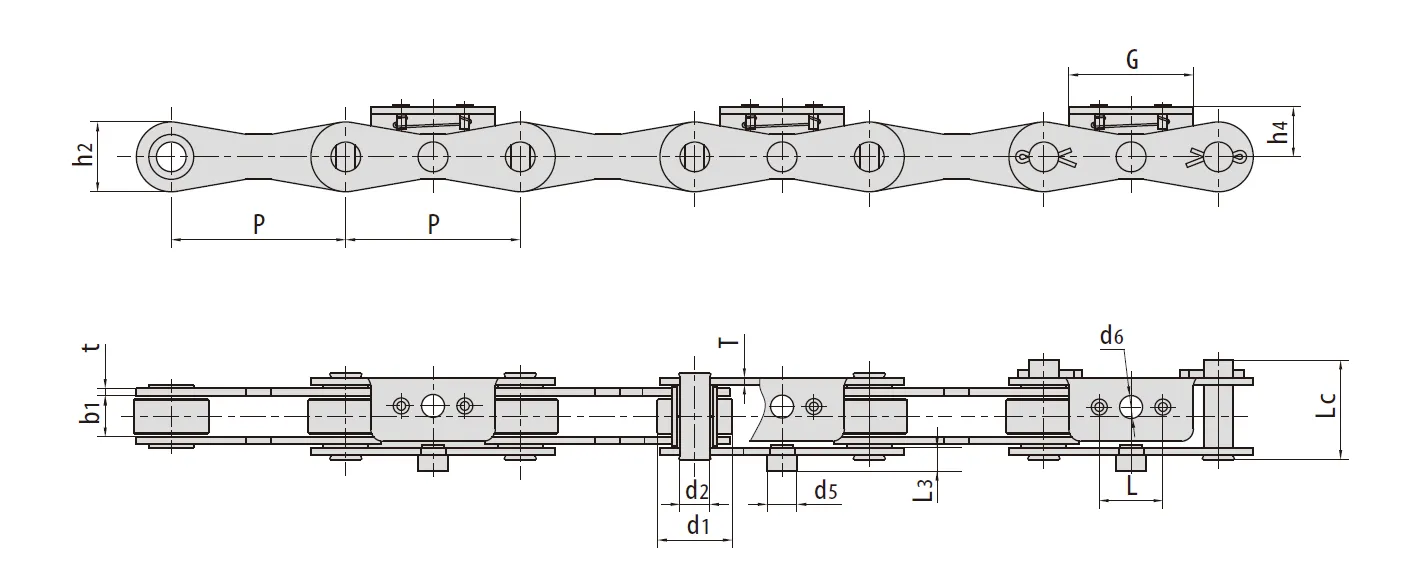
| Chain No. | Pitch | Roller diameter | Width between inner plates | Pin diameter | Pin length | Plate dimension | Attachment dimension | Tensile strength | ||||||
| P | d1 max | b1 min | d2 max | Lc max | h2 max | t/T max | h4 | d5 | d6 | G | L | L3 | Q min | |
| mm | mm | mm | mm | mm | mm | mm | mm | mm | mm | mm | mm | mm | kN/lbf | |
| P70F2SS | 70.00 | 30.00 | 15.75 | 11.98 | 39.9 | 28.0 | 3.1 | 20.0 | 12.0 | 9.2 | 50.0 | 25.5 | 7.0 | 22.5/5058 |
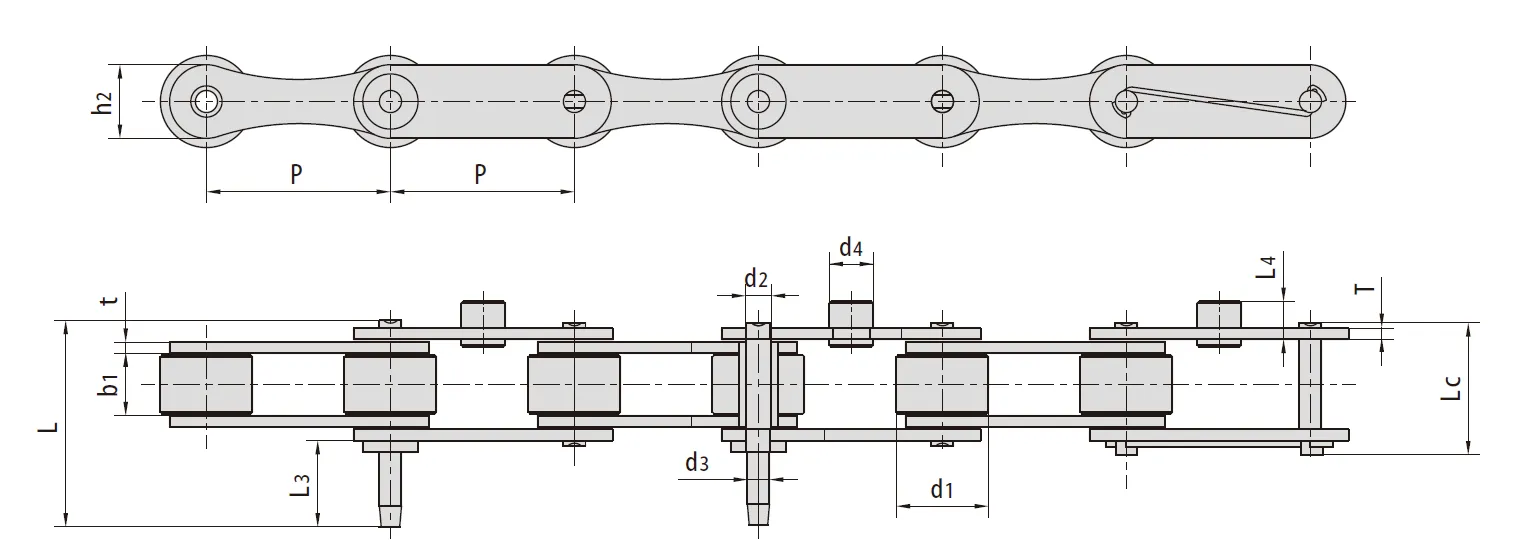
| Chain No. | Pitch | Roller diameter | Width between inner plates | Pin diameter | Pin length | Plate dimension | Attachment dimension | Tensile strength | |||||
| P | d1 max | b1 min | d2 max | L max | Lc max | L3 | h2 max | t/T max | d3 | d4 | L4 max | Q min | |
| mm | mm | mm | mm | mm | mm | mm | mm | mm | mm | mm | mm | kN/lbf | |
| P50F10SS | 50.00 | 25.00 | 18.00 | 7.00 | 56.2 | 35.7 | 25.5 | 20.0 | 3.0 | 6.00 | 12.0 | 10.0 | 25.0/5620 |

| Chain No. | Pitch | Roller diameter | Width between inner plates | Pin diameter | Pin length | Inner plate depth | Plate thickness | Tensile strength | Weight per meter | |||
| P | d1 max | b1 min | d2 max | d3 max | L max | Lc max | L3 | h2 max | t/T max | Q min | q | |
| mm | mm | mm | mm | mm | mm | mm | mm | mm | mm | kN/lbf | kg/m | |
| P100F135SS-D3 | 100.00 | 30.00 | 18.20 | 10.00 | 12.00 | 61.6 | 68.0 | 29.0 | 25.0 | 3.0 | 30/6744 | 2.8 |
Benefits of Stainless Steel Conveyor Chain for Cold Drink Production
- Corrosion Resistance: Stainless steel is highly resistant to corrosion, making the conveyor chain ideal for use in wet and humid environments. This ensures durability even when exposed to liquids, cleaning agents, and temperature fluctuations in beverage production lines.
- Hygienic and Easy to Clean: The smooth surface of stainless steel resists contamination and is easy to clean, ensuring compliance with food safety standards. This makes it ideal for handling cold drinks, where hygiene is a top priority to prevent product contamination.
- Durable and Long-Lasting: Stainless steel conveyor chains are highly durable, withstanding heavy loads, high speeds, and continuous operation. Their robust construction reduces wear and tear, minimizing the need for frequent maintenance and ensuring long-term reliability in demanding production settings.
- Temperature Resistance: These chains can endure extreme temperature conditions, including cold or heat exposure during cleaning and sterilization processes. This adaptability ensures consistent performance, particularly in cold drink production where cooling systems are frequently involved.
- Smooth and Efficient Operation: Stainless steel chains provide a stable and smooth flow of goods, reducing friction and minimizing product damage. This efficiency is critical in high-speed beverage production lines to maintain quality and prevent bottlenecks in the process.
- Customizable for Specific Needs: Stainless steel conveyor chains can be tailored to suit the unique needs of a production line, including different sizes, designs, and load capacities. This flexibility ensures they can handle various cold drink container types, from bottles to cans, seamlessly.
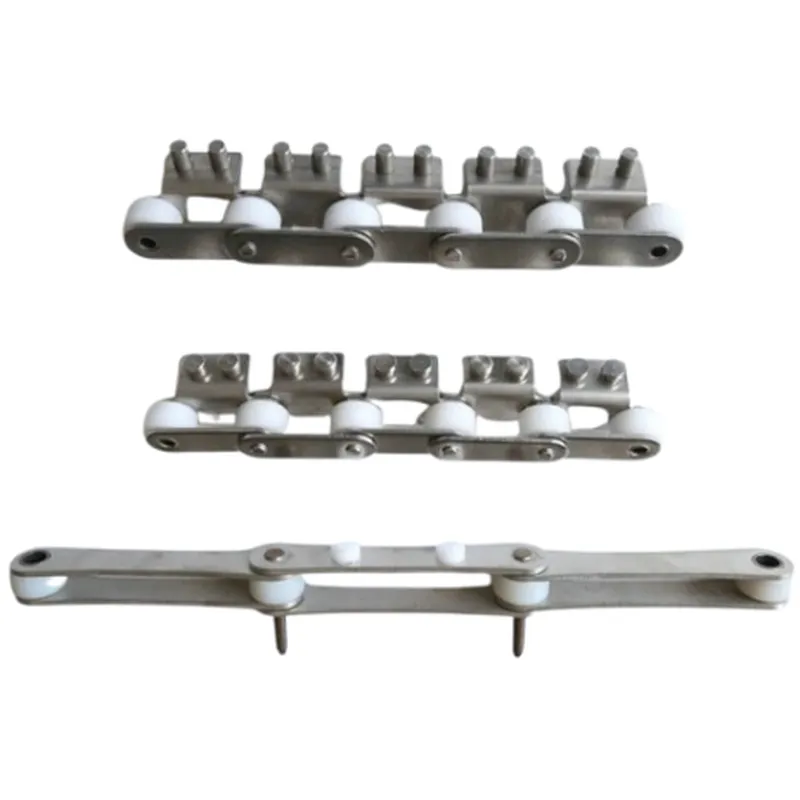
Applications of Stainless Steel Conveyor Chain for Cold Drink Production
Stainless steel conveyor chains are critical in cold drink production due to their durability, hygiene, and resistance to harsh conditions. Here are detailed applications:
- Beverage Bottling and Filling Lines: Stainless steel conveyor chains are used to transport bottles or cans through filling stations in cold drink production. Their corrosion resistance ensures reliability in wet environments, maintaining hygiene and preventing contamination during high-speed bottling processes.
- Cooling and Pasteurization Processes: These stainless steel chains facilitate the movement of containers through cooling tunnels or pasteurization units. Their ability to withstand extreme temperatures and resist rust ensures consistent performance, supporting efficient cooling of beverages post-filling for quality assurance.
- Cleaning and Sanitization Stations: In cold drink production, conveyor chains transport containers through automated cleaning systems. Stainless steel’s non-reactive surface resists harsh cleaning chemicals, ensuring durability, hygiene, and compliance with strict food safety regulations.
- Packaging and Palletizing Systems: Stainless steel chains are employed in conveying filled bottles or cans to packaging and palletizing areas. Their strength supports heavy loads, while corrosion resistance ensures longevity in humid environments, enhancing operational efficiency.
- Carbonated Drink Processing: During carbonation, stainless steel chains handle containers in high-pressure, moist conditions. Their robust construction and resistance to corrosion prevent breakdowns, ensuring smooth, uninterrupted production of carbonated beverages with minimal maintenance.
- Refrigerated Storage Transport: These stainless steel chains move products through refrigerated storage areas. Their ability to function in low temperatures without corroding or becoming brittle ensures reliable transport, maintaining product quality and operational uptime in cold environments.
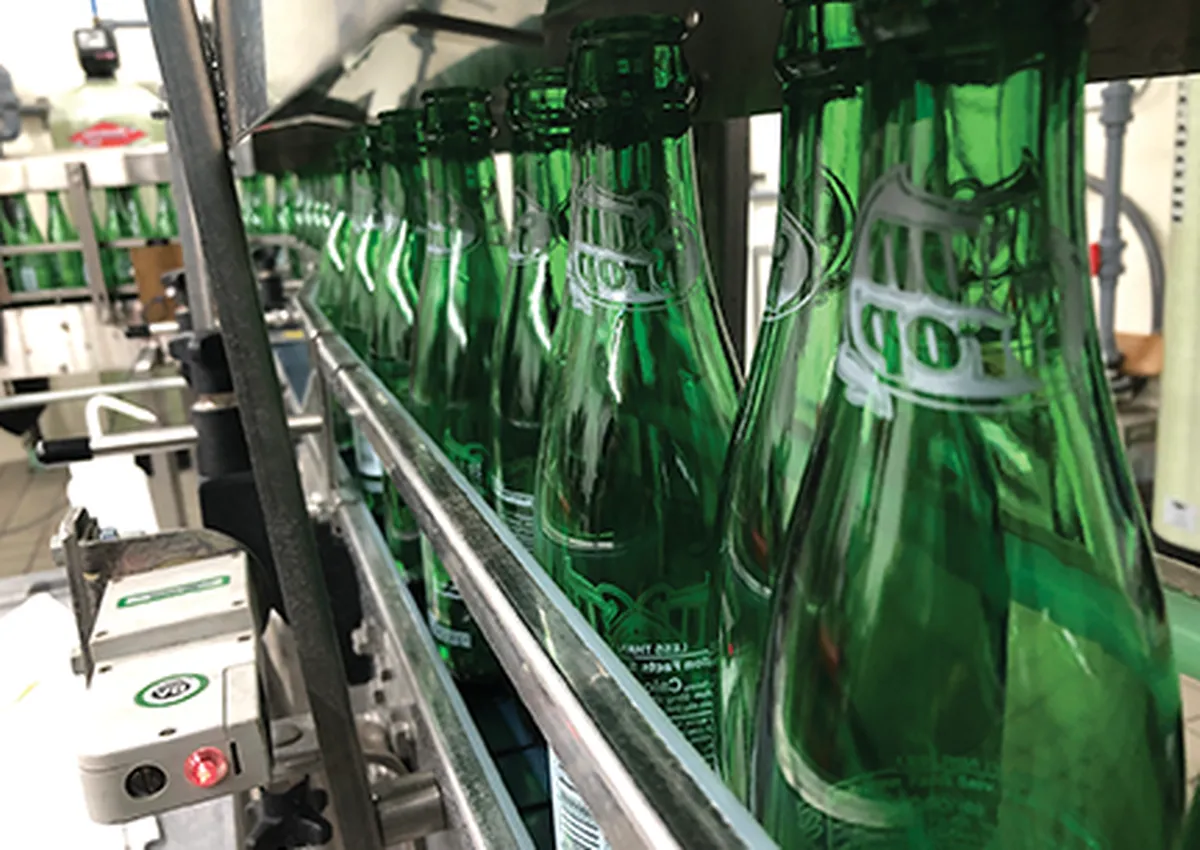 | 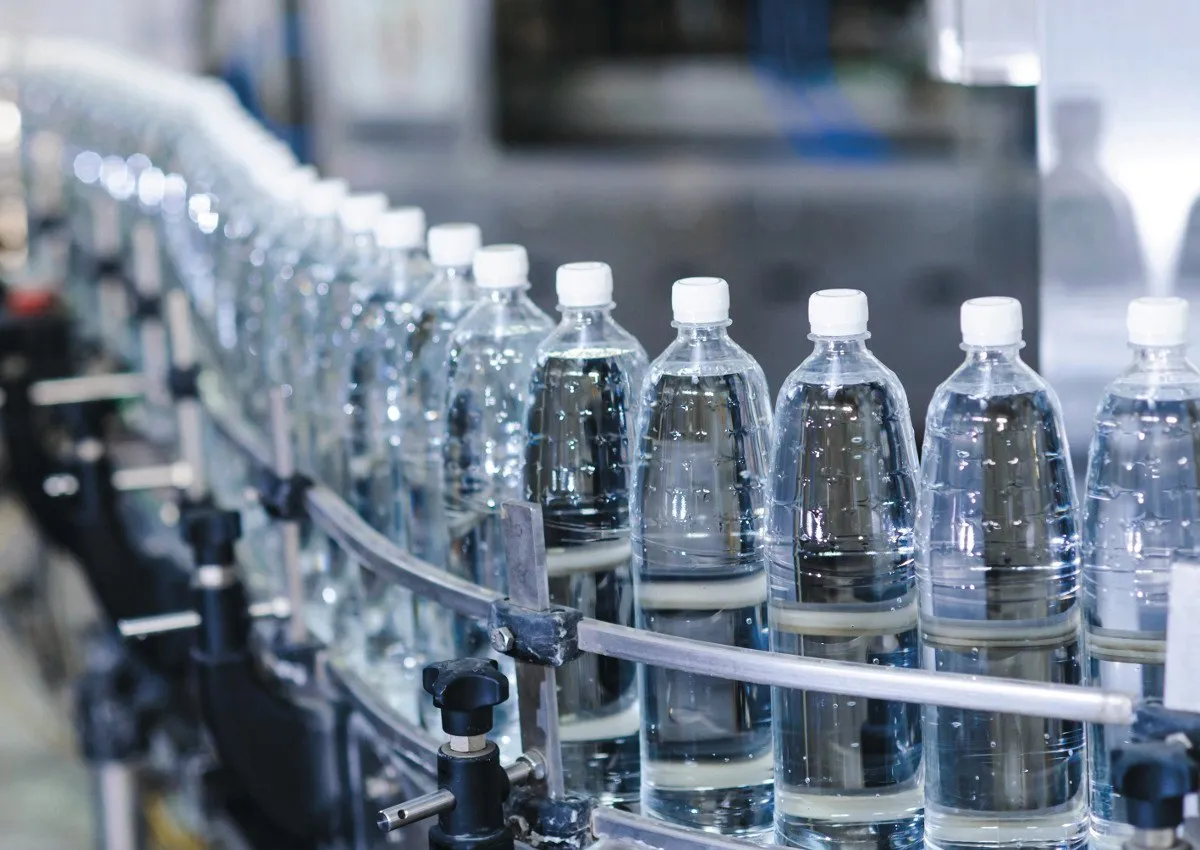 |
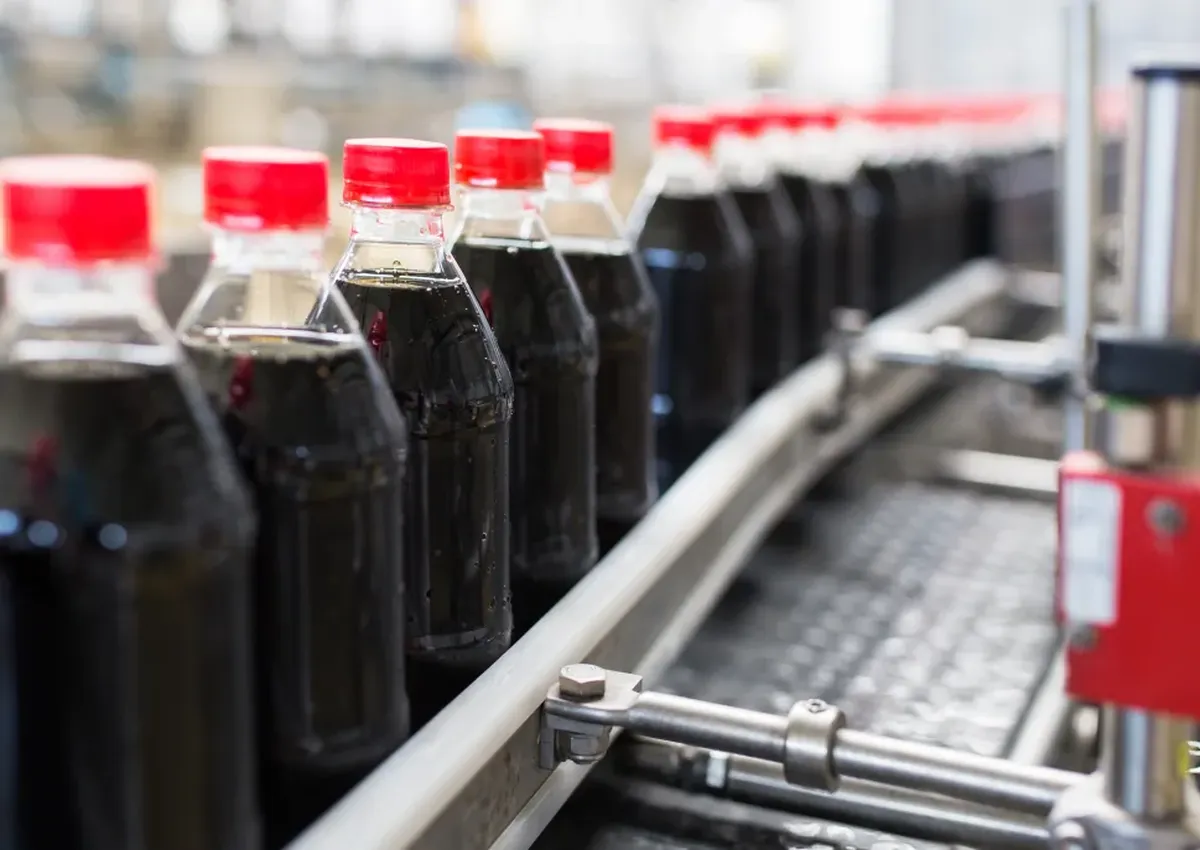 | 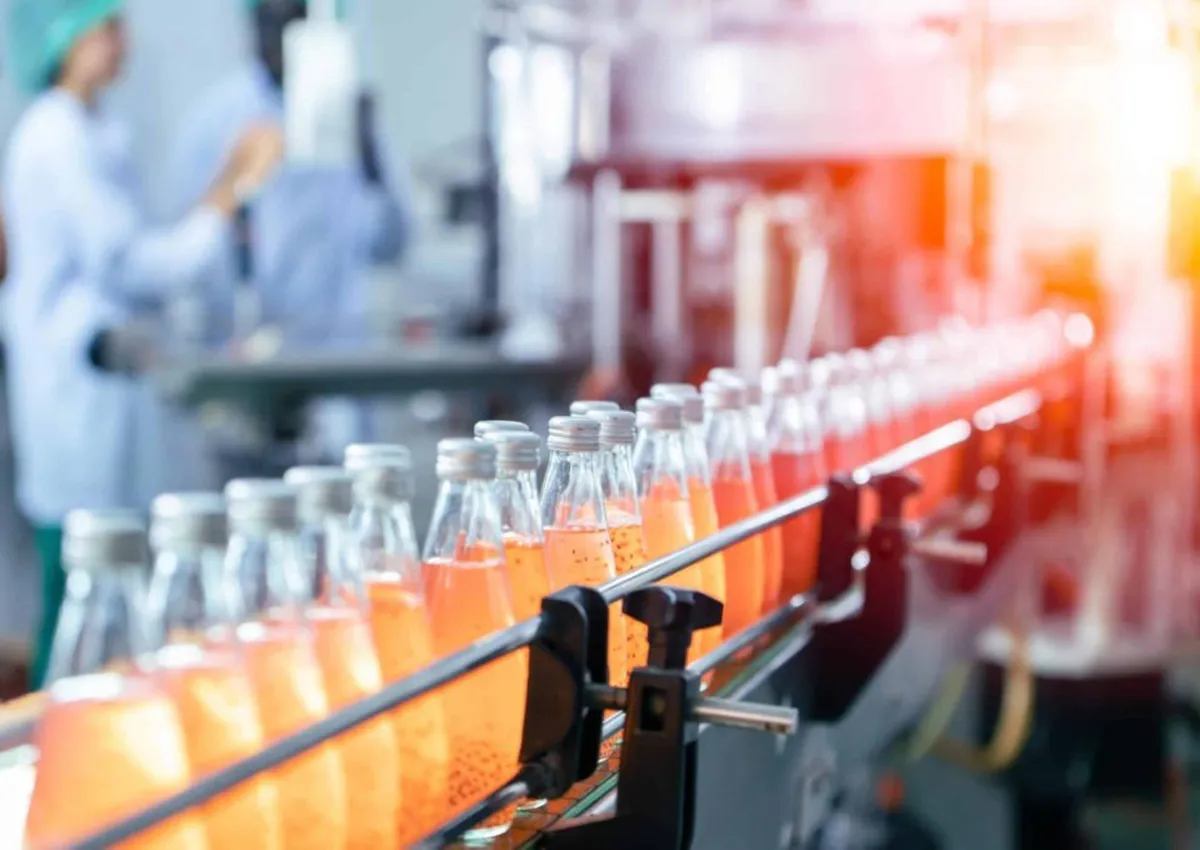 |
Stainless Steel Conveyor Chain FAQ
Q: Why is stainless steel preferred for conveyor chains in beverage production?
A: Stainless steel is chosen for its excellent corrosion resistance, durability, and hygiene. It withstands exposure to moisture, cleaning agents, and temperature variations, which are common in cold drink production lines, ensuring long-lasting performance and compliance with food safety regulations.
Q: How does a stainless steel conveyor chain enhance hygiene in cold drink production?
A: Stainless steel has a smooth, non-porous surface that resists bacteria and contamination. It's easy to clean and sterilize, making it ideal for maintaining hygiene in food-grade environments like beverage production, where cleanliness is critical to product safety and quality.
Q: Can stainless steel conveyor chains handle high-speed production lines?
A: Yes, these chains are specifically designed for high-speed operations. Their robust construction ensures smooth and reliable movement of products without misalignment or damage, even in demanding production lines operating at high speeds to meet large-scale output requirements.
Q: What types of beverages can stainless steel conveyor chains handle?
A: These chains are versatile and can handle virtually all types of cold beverages, including soft drinks, juices, bottled water, energy drinks, and alcoholic beverages. They can accommodate different container types, such as glass bottles, aluminum cans, and plastic bottles.
Q: How does a stainless steel conveyor chain reduce maintenance costs?
A: Thanks to its high durability and resistance to wear, corrosion, and environmental damage, stainless steel conveyor chains require minimal upkeep. This reduces the frequency and cost of repairs or replacements, ensuring long-term cost savings and uninterrupted production.
Q: Can stainless steel conveyor chains be customized for specific production requirements?
A: Yes, they can be customized to fit specific production needs, such as varying chain sizes, designs, and load capacities. This flexibility ensures seamless integration with different conveyor systems, accommodating various container shapes, weights, and production speeds.
Additional information
| Edited by | Yjx |
|---|

